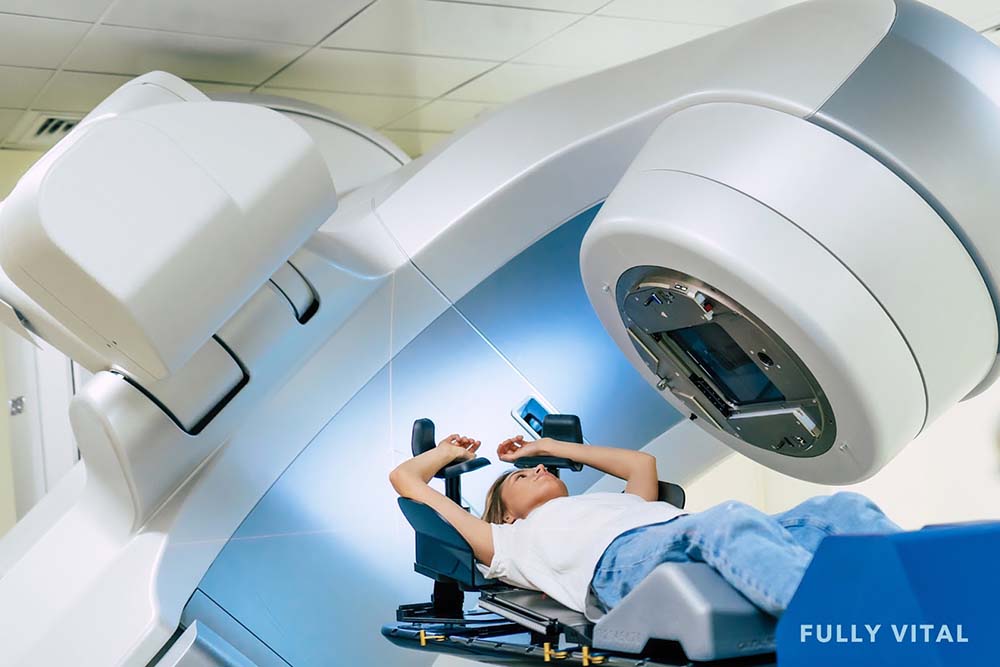
Radiotherapy: Understanding The Basics
As part of our comprehensive guide to all things related to hair growth products, we want to shed some light on the topic of radiotherapy.
This article will explore what radiotherapy is, why it's important, how it works, its benefits, downsides, and alternative options.
So, let's get started!

I LOVE MY HAIR NOW
FullyVital hair serum and hair vitamins made tremendous improvements in my hair. I truly love my hair now.
Dorit S.,
What Is Radiotherapy?
Radiotherapy, also known as radiation therapy, is a medical treatment that uses high doses of radiation to target and destroy cancer cells or abnormal tissues in specific areas of the body.
It is commonly used in cancer treatment, but it can also be employed for non-cancerous conditions.
The goal of radiotherapy is to damage the DNA within the targeted cells, preventing them from multiplying and ultimately leading to their death.

Why Is Radiotherapy Important?
Radiotherapy plays a crucial role in cancer treatment and has proven to be effective in both curing and controlling the growth of cancerous tumors.
It is often used as the primary treatment method or in combination with other therapies like surgery or chemotherapy.
For many cancer patients, radiotherapy offers a chance at remission or a significant improvement in their quality of life.1
How Does Radiotherapy Work?
Radiotherapy utilizes various types of radiation, such as X-rays or proton beams, which are carefully directed at the tumor or affected area.
The treatment is precisely planned to maximize the radiation's impact on the abnormal cells while minimizing exposure to surrounding healthy tissues.
Modern advancements in technology have allowed for more accurate and targeted delivery of radiation, leading to better outcomes and reduced side effects.2
What Are The Benefits Of Radiotherapy?
Radiotherapy offers several benefits, including:
Effective Cancer Treatment
Radiotherapy has a high success rate in shrinking or eliminating tumors, leading to positive treatment outcomes.3
Preserving Organ Function
In some cases, radiotherapy can help preserve the function of vital organs by targeting cancerous cells while sparing healthy tissue.
Non-Invasive Treatment Option
Radiotherapy is a non-surgical treatment, making it less invasive and suitable for patients who may not be eligible for surgery.
Complementary To Other Treatments
It can be used in conjunction with surgery or chemotherapy to enhance the overall treatment effectiveness.
Are There Any Downsides To Radiotherapy?
While radiotherapy offers numerous benefits, it also has some potential downsides:
Side Effects
Like any medical treatment, radiotherapy may cause side effects. Common side effects include fatigue, skin changes, and localized discomfort.
Long-Term Effects
In some cases, patients may experience long-term side effects, although advancements in treatment planning have reduced this risk significantly.
Limited Use In Some Cases
Radiotherapy may not be suitable for certain cancer types or stages, depending on the specific circumstances.
What Are The Alternatives To Radiotherapy?
Although radiotherapy is a highly effective treatment option, there are alternative approaches for cancer treatment and symptom management.
Some alternatives include:
Surgery
Surgical procedures can be used to remove tumors or affected tissues directly.
Chemotherapy
This treatment uses drugs to target and kill cancer cells throughout the body.
Immunotherapy
Immunotherapy works by stimulating the patient's immune system to identify and attack cancer cells.
Hormone Therapy
This approach is used for cancers that are hormone-sensitive, blocking hormone production or action to slow down cancer growth.
What Is The History Of Radiotherapy?
The history of radiotherapy dates back to the late 19th century when Wilhelm Conrad Roentgen discovered X-rays in 1895, leading to groundbreaking advancements in medical imaging and radiation therapy.
Here's a brief overview of key milestones in the history of radiotherapy:
-
1896: The first recorded use of X-rays in medical treatment occurred in France, where they were applied to treat skin conditions.
-
Early 1900s: The therapeutic potential of radiation was explored further, and it became a common treatment for certain conditions.
-
1920s-1930s: Radiotherapy gained popularity as a cancer treatment, with improved technology and understanding of radiation's effects on tumors.
-
1950s-1960s: Advancements in linear accelerators and other equipment led to more precise and targeted radiation delivery.
-
Modern Era: Today, radiotherapy continues to evolve with cutting-edge technologies, such as intensity-modulated radiation therapy (IMRT) and stereotactic radiosurgery (SRS), further improving treatment outcomes.
What Is The Current Environment Of Radiotherapy?
The current environment of radiotherapy is marked by significant progress in treatment techniques, patient safety, and personalized care.
Some key aspects of the present-day radiotherapy landscape include:
-
Advanced Technology: Modern radiotherapy equipment allows for highly targeted and precise radiation delivery, minimizing damage to healthy tissues.
-
Individualized Treatment Plans: Radiotherapy is now tailored to each patient's specific condition and needs, optimizing effectiveness and reducing side effects.
-
Combination Therapies: Radiotherapy is often used in combination with other treatment modalities, such as surgery, chemotherapy, and immunotherapy, to enhance outcomes.
-
Enhanced Patient Comfort: Efforts are made to improve patient comfort during treatment, such as shorter treatment times and better positioning techniques.
-
Ongoing Research: Extensive research and clinical trials continue to explore new approaches, combinations, and technologies in radiotherapy.
What Is The Future Of Radiotherapy
The future of radiotherapy holds even more promise for both cancer treatment and hair growth product research.
Some potential developments on the horizon include:
-
Particle Therapy: Particle therapy, such as proton therapy and carbon ion therapy, shows great potential in delivering precise radiation doses and minimizing damage to healthy tissues.
-
Imaging Advancements: Improved imaging techniques will allow for better visualization of tumors and real-time monitoring during treatment.
-
Immunoradiotherapy: The combination of radiotherapy with immunotherapy is being explored as a way to enhance the body's immune response against cancer cells.
-
Gene Therapy: Radiotherapy might be combined with gene therapy to target specific genes associated with cancer growth.
-
Hair Growth Research: Ongoing research may reveal the potential of radiotherapy in stimulating hair follicles and promoting hair growth in certain conditions.
Our Best Sellers
Will I Experience Fatigue During Radiotherapy?
Fatigue is a common side effect of radiotherapy, and it can vary from person to person.
The radiation may affect healthy cells temporarily, leading to tiredness and a lack of energy.
Here's what you can do to manage radiotherapy-related fatigue:
-
Rest: Make sure to get enough rest and listen to your body's signals for when it needs to rest.
-
Stay Active: Engage in light exercises or activities to maintain energy levels, but avoid overexertion.
-
Eat Well: Maintain a balanced diet and stay hydrated to support your body during treatment.
-
Ask for Help: Don't hesitate to seek assistance from family or friends with daily tasks if needed.
Can I Wear Jewelry Or Metal Objects During Radiotherapy Sessions?
It's essential to avoid wearing jewelry or metal objects during radiotherapy sessions.
Metal can interfere with the accuracy of radiation delivery and potentially harm healthy tissues.
Follow these guidelines:
-
Remove Jewelry: Take off all jewelry, including rings, necklaces, bracelets, and body piercings, before each session.
-
Notify Staff: Inform the radiotherapy team if you have any implanted medical devices or metal objects in your body.
Are There Any Specific Aftercare Instructions I Should Follow?
After completing your radiotherapy sessions, you may be given specific aftercare instructions to promote healing and minimize side effects.
These instructions might include:
-
Skin Care: Follow any recommended skincare routines to address radiation-induced skin changes.
-
Medications: Take prescribed medications as directed to manage any side effects or discomfort.
-
Follow-Up Appointments: Attend all scheduled follow-up appointments to monitor your progress and recovery.
-
Lifestyle Recommendations: Follow any lifestyle guidelines provided by your medical team to support your overall well-being.
Can Radiotherapy Cause Infertility?
Radiotherapy can potentially affect reproductive organs and lead to infertility, depending on the treatment area and dose.
If preserving fertility is a concern for you, consider discussing the following options with your medical team:
-
Fertility Preservation: Before starting radiotherapy, explore fertility preservation methods, such as egg or sperm freezing.
-
Alternative Treatments: In some cases, alternative treatment approaches may be available that carry a lower risk of infertility.
What Should I Do If I Miss A Scheduled Radiotherapy Session?
Missing a scheduled radiotherapy session can have implications for the effectiveness of treatment.
If you cannot attend a session, take the following steps:
-
Contact Your Medical Team: Inform your radiotherapy team as soon as possible to reschedule the missed session.
-
Stay on Track: It's crucial to complete the prescribed course of treatment, so work with your medical team to find an appropriate solution.
-
Avoid Skipping Multiple Sessions: Missing multiple sessions can impact treatment outcomes, so prioritize attendance as much as possible.
Unlock The Power Of Thriving Hair With Fully Vital!Are you tired of dealing with the signs of aging hair, longing for a healthier, revitalized relationship with your locks? Look no further! At Fully Vital, we are dedicated to transforming your hair care journey with our science-backed hair growth products. Key Features:
Benefits:
Join the Fully Vital Revolution Today! Unlock the true potential of your hair with our hair growth products. Embrace a healthier relationship with your locks and embark on a journey of revitalization and beauty. |
Final Thoughts On Radiotherapy
Understanding radiotherapy and its significance in cancer treatment and potential hair growth stimulation is crucial for women of all hair types seeking to enhance their well-being.
Throughout this article, we've explored what radiotherapy is, how it works, its benefits, potential downsides, and alternative options. We've also delved into essential FAQs, the history of radiotherapy, its current landscape, and exciting possibilities for the future.
At Fully Vital, we are committed to providing you with the knowledge and resources to support your journey towards healthier hair and a more positive relationship with your locks.
Our range of hair growth products is designed to combat the aging effects on your hair and promote natural growth and vitality.
Embrace the power of informed decision-making, and discover the best solutions to nourish and revitalize your hair.
Frequently Asked Questions About Radiotherapy
Is radiotherapy painful?
Radiotherapy itself is painless, but some patients may experience discomfort or side effects during or after treatment.
How long does a typical radiotherapy session last?
The length of each session can vary, but it usually lasts for about 15 to 30 minutes.
How many radiotherapy sessions will I need?
The number of sessions depends on the type of cancer, its stage, and the treatment plan recommended by your medical team.
Can I continue with my daily activities during radiotherapy?
Yes, in most cases, patients can continue their daily activities while undergoing radiotherapy.
Will I lose my hair during radiotherapy?
Hair loss is not a common side effect of radiotherapy unless the treatment is targeting the head or neck area.
Are there any specific preparations needed before starting radiotherapy?
Your medical team will provide you with specific instructions, but generally, no special preparations are required.
Can radiotherapy be used to treat non-cancerous conditions?
Yes, radiotherapy can be used to treat certain non-cancerous conditions, such as benign tumors and some skin disorders.
What happens after my radiotherapy treatment is completed?
Your medical team will monitor your progress and may recommend follow-up appointments to assess your response to treatment.
Are there any foods or activities to avoid during radiotherapy?
Your medical team will provide dietary and lifestyle guidelines during treatment, as some foods or activities may interfere with the process.
Can I undergo radiotherapy if I am pregnant?
Radiotherapy is generally not recommended during pregnancy due to potential risks to the developing fetus. However, each case is assessed individually by the medical team.
Source:
-
National Cancer Institute. (2019, January 8). Radiation Therapy To Treat Cancer. National Cancer Institute; Cancer.gov. https://www.cancer.gov/about-cancer/treatment/types/radiation-therapy
-
Mayo Clinic. (2020, July 1). Radiation therapy - Mayo Clinic. Mayoclinic.org. https://www.mayoclinic.org/tests-procedures/radiation-therapy/about/pac-20385162
-
Radiation Therapy. (n.d.). CancerQuest. https://cancerquest.org/patients/treatments/radiation-therapy







